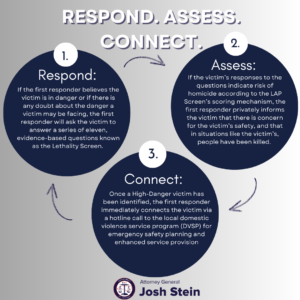InterAct’s L.A.P (Lethality Assessment Protocol) Program
The Lethality Assessment Protocol (LAP) Program was established in Wake County following a recommendation made by the Domestic Violence Fatality Review Team.
LAP is an evidence-based practice developed by Dr. Jacqueline Campbell and the Maryland Network Against Domestic Violence (MNADV).
Current LAP partners include Apex Police Department, Cary Police Department, Fuquay-Varina Police Department, Garner Police Department, Holly Springs Police Department, Morrisville Police Department, Raleigh Police Department, Wake Forest Police Department, Wake County Sheriff’s Department, and WakeMed Health and Hospitals.
The program is two-fold:
- Provides first responders (law enforcement and emergency room personnel) with a validated screening tool to assist them in identifying survivors who are at an increased risk of being seriously injured or killed by their abusers.
- Establishes a protocol for immediately referring those at high risk to InterAct for crisis intervention and ongoing services.
The goal of LAP is to prevent serious injuries and homicides related to intimate partner violence through enhanced awareness, communication, coordination, and access to services.
The LAP screening tool was developed to assist first responders in assessing a survivor’s level of risk and facilitating a conversation about the survivor’s safety with InterAct.
The InterAct staff also uses the LAP screening tool to assess the client’s level of risk when survivors make contact via the crisis lines or walk-in services. This is a good use of the screening tool, and responses to LAP screens conducted by InterAct staff are documented and used for safety planning purposes.
Intimate partner homicides occur primarily in situations with specific, predictable factors. Knowledge about these factors makes homicides preventable because it indicates when intervention is most critical. Research demonstrates that some elements in intimate partner relationships lead to homicide or attempted homicide. As such, one of the basic premises of the LAP is that intimate partner homicide is predictable and, therefore, preventable if evidence-based, proactive protocols are applied to identify and respond to high-danger situations.
The LAP can:
- Show a victim/survivor how dangerous their situation is.
- Provide education on the risk of lethality.
- Communicate empathy and support.
- Demonstrate a community effort to address intimate partner violence.
- Create a warm handoff from Law Enforcement to a Domestic Violence Service Provider.
- A way to plan and discuss safety.
- The chance to connect with critical services available in the community is designed to support their decisions dealing with intimate partner violence.
- Create an opportunity to empower victims/survivors to pursue a violent-free life.
To learn more about the LAP program, visit MNADV.org or the NC Department of Justice for North Carolina-specific information.

